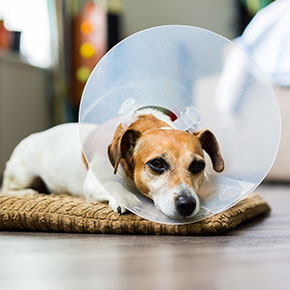
Dog neutering advice from The Vet Whetstone
August 14, 2019
If you’re considering having your dog neutered, you probably have questions about the procedure itself as well as the pros and cons.
Book an appointment with one of our vets to discuss the benefits of neutering and to ask any questions you may have about the procedure. Neutering is usually carried out at around 6-8 months of age.
Contact us for neutering advice
Reasons to neuter your dog
Females (spaying)
- Stops your dog from coming into season.
- Prevents phantom and unwanted pregnancies.
- Reduces risk of mammary tumours (breast cancer).
- Eliminates the possibility of life-threatening pyometra (uterine infection).
Males (castration)
- Reduces wandering and therefore the chances of being involved in a road accident.
- Helps with behavioural issues.
- Reduces risk of prostate disease.
- Eliminates risk of testicular cancer.
Disadvantages of neutering
As with all operations under general anaesthesia there is some, but very low, risk attached.
Weight gain can be a problem, as neutering can reduce the metabolic rate. So, your dog will need less food – a lower-calorie diet may even be required.Our head vet, Albert, advises regular weight checks after neutering with one of our practice nurses.
Urinary incontinence in females can be a problem later in life. This is usually well controlled with medication.
The process of neutering
Your pooch will be admitted for surgery on the morning of the operation and examined by a vet prior to the procedure. Careful monitoring is carried out before, during and after the operation. Pets usually go home on the same day with pain relief; they’re then seen a few days later for a post-op check.
What if I want to breed from my dog?
Breeding dogs can be straightforward but there can be complications. Females can require a caesarean section if they have problems giving birth. Male dogs can have more behavioural issues if used as studs.